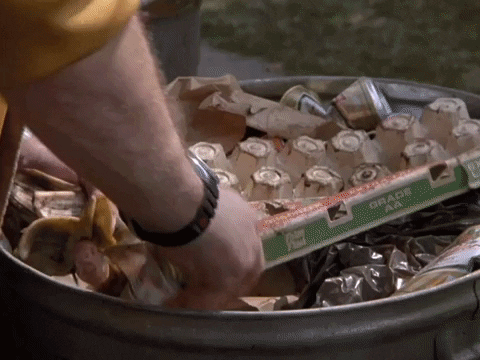You know the film Back to the Future?
The whole plot revolves around repairing the time machine’s flux capacitor - the bit that makes it possible to travel through time.
While I was editing the first draft I connected the words fluctuate and capacity. My geek brain immediately jumped to flux capacitor. So I’ve decided to illustrate this newsletter with Back to the Future gifs.
Ok, let me get back on track.
Neurodivergent brains are always taking in more sensory input than our neurotypical peers. That means our capacity (our ability to do things) is always fluctuating depending on our environment and life circumstances.
Before parenthood I could pretty much always push past my limits. I had the capacity to manage a lot of things in my work because of the priviledge and flexibility in my personal life. I had time and space to reset and recover in my own time.
But parenting is an energetic and sensorial drain. Meanwhile I have fewer supports like adequate sleep, solitude to reset, and extra time to transition or complete tasks.
When new parenthood met pandemic life I quickly learned my capacity is insepearble from my supports and whether my autistic needs are being met.
(Can of worms, but capacity is often referred to by the outdated term “functioning level” which is inaccurately imagined as fixed.)
The idea that we have a fluctuating capacity to focus, or be organized, or get stuff done is often hard for neurotypicals to understand. When someone sees we’re able to drive or cook or talk to a room full of people they might assume we can do these things all the time. Or they may not realize the toll it takes on us before and afterward.
The smallest factor can tip the scale and drain our capacity. And so our ability varies every day.
One day I might bake from scratch sourdough banana bread.
The next day I might not be able to prepare any food at all.
A neurodiversity affirming approach means having supports and alternatives in place when capacity does not match intentions.
In the case of food that might be: batch cooking when capacity is high, grab and go food, healthy snacks, ordering takeout, or asking for help. Or in my case setting a timer to make sure I prepare meals in advance because I can’t cook if I’m hungry.
So I’m cultivating awareness of my own capacity. And I’m learning to make adjustments. This is incredibly hard and not at all intuitive.
Neurodivergent folk often hyper focus on something to the point our physical bodies melt away.
This is one reason we end up overcommitting. We take on projects when are running high on hyper focus and when we land in our bodies realize we’ve taken on too much.
Other times our environment or circumstances change.
This has happened to me with this project.
I had a vision for sending out book chapters every month, but that structure isn’t aligned with my current capacity.
Past me would have pushed myself into burn out. But I am learning to make adjustments for my current energy levels. Rather than seeing this as a failure I am trying to reframe it as a strength.
Often, especially for austitics, black and white thinking can keep us from even seeing the option to restructure commitments, take a break, or ask for help.
Bonus content!
I’m fascinated / obsessed with the idea that ADHD & Autism may be part of the same spectrum. Both diagnosis profiles are based on outdated stereotypes and external behaviors versus internal experiences.
Here are two neuroscience studies exploring how there may not be a scientific basis for separate diagnosis.
Discussion time!
So many of us found our place in the world by being “organized” or “helpful”. We’re white knuckling our way through the world clinging to those moments of praise and think that’s where our worth is.
Meanwhile we’re doing real harm to ourselves trying to maintain impossible levels of professionalism and productivity so we don’t appear “lazy” or “flighty”.
How perfectly neurodivergent is this Maria song? (Sorry not sorry for my segueway from Sci Fi to Musical Theatre. It’s who I am.) 😂
Do you struggle with knowing your capacity or managing commitments?
How do you know when you’ve taken on too much?
Originally published to Substack on October 7, 2022.




